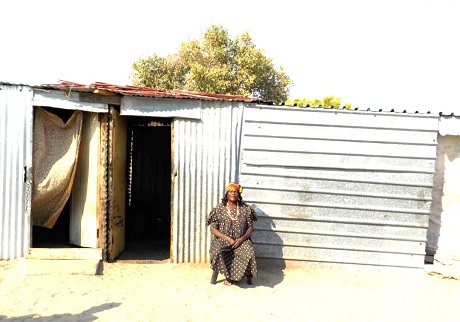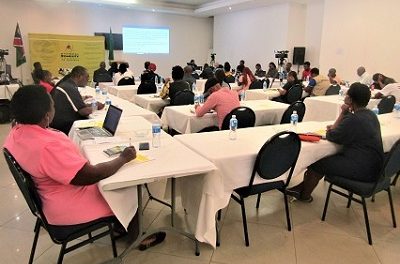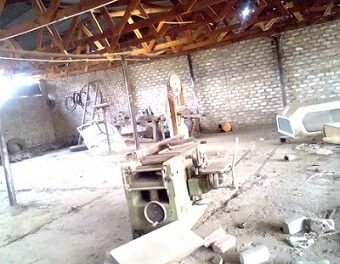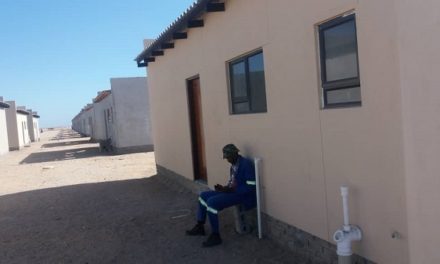By Elina-Ombili Shishaki /
With the cost of living increasing by leaps and bounds on a daily basis, residents of Kaniita face an uphill battle in fighting not only for what to eat but also how to find a decent shelter over their heads.
Kaniita, an informal settlement in the town of Omuthiya, Oshikoto Region, is home to hundreds of families who are at the very bottom of the socio-economic pyramid.
These people live in housing structures made out of corrugated iron sheets, without electricity, no running water, and without adequate sanitation; and these are just some of the major hurdles in their everyday life.
Mrs Paulina Johannes, a 63 year-old war veteran and retired cleaner narrates how she has always struggled to cater for her family’s everyday essentials although she receives a monthly income in the form of state grants.
“I used to work for the Ministry of Works and Transport as a cleaner, the position I held for 24 years till retirement. I was stationed at the Windhoek office and then got transferred to Omuthiya,” Mrs Johannes narrates.
“I live in my three bedroom shack house with my husband and my three grandchildren. We have been living here for eight years now.”
Although Johannes earns both old age pension and war veteran grants monthly, she says this has never been enough to get her and her family out of the shack and move to a better housing.
“My first child who was born during the liberation struggle is yet to secure employment. Though I have a village house in Onamutai, the situation is such that I am now forced to live in Kaniita to take care of my grandchildren who are schooling at a nearby school,” she stresses.
“The money I receive monthly is still not enough to cover all the expenses for my family since they all entirely depend on me.”
Mrs Johannes states that had it not been for the sake of her grandchildren who go to school in Omuthiya, she would have preferred to live at her village home.
“What makes matters worse here is that there are no proper toilet facilities, neither is there electricity nor a public water point in the location. The street light installed in this area only caters for some shack dwellers while at our side it gets dark at night since the lights couldn’t reach up to our house,” she says.
She adds that the cost of buying water daily from her neighbours is significantly adding up to her monthly expenses.
“But for now that the public water tap is closed I have opted to pay for a water card to use at a prepaid tap available in our location and this may prove too costly for me.”
Johannes points out that although she has worked and lived in Omuthiya for long, she does not have a land or plot on her name.
In another neighbourhood of the same Kaniita settlement is Mrs Martha Shituleipo, a 50 year-old who hailed from Omunda village in Eengodi Constituency. Shituleipo has lived in a shack for over 30 years.
“When Omuthiya was declared a town I was relocated here at Kaniita where I erected again my shack house,” she says.
“I live here with eight other occupants. My sister used to own this shack, but after her death I had to move in here and take over and shoulder the responsibilities of this household.
“None of us has a job; at times I get temporary jobs from the town council like debushing and removing shrubs around the town, but mostly I sell firewood and kapana to make a living and cater to the needs of my household.”
Shituleipo further points at the battle she faces with day to day challenges caused by poverty. “Now that my corrugated iron sheets are worn out, animals like goats and pigs constantly barge into our house and destroy our goods.
“I wish that I could join housing projects such as the Shack Dwellers Federation and others but I am facing major financial constraints.”
In the same neighbourhood of Shituleipo is Ms Anna Elifas, a single mother who earns a living by selling traditional alcoholic beverages commonly known as “Otombo” and “Okatokele” to feed her family of seven.
“This is my only source of income. But the issue of water is negatively affecting my business, for it to operate I have to buy water from other residents and it costs a lot of money,” Ms Elifas laments.
“I am the sole breadwinner and we don’t receive any drought relief items. None of my household members has a proper job, so I single-handedly manage both the business and the house.”
Similarly, in dwelling unit number 125 lives Mr David Kawasha, a 56 year-old hardworking and crafty individual whose family’s livelihood depends on the income he makes by weaving palm leaf mats and hats.
Kawasha says that he used to work as a labourer at a Chinese-owned company in Oshakati, but later got transferred to Omuthiya where he has lived until now.
When he unfortunately lost his job he then started selling goods at the open market. However his entrepreneurial dreams were shattered due to an illness he suffered from.
“When I lost my job I started selling goods at the open market, little did I know that my life will turn from better to worse,” Kawasha reminisces.
“I was really suffering from a serious sickness, thus I lost everything and stopped doing business. My shack house was in town, but then got relocated to Kaniita location by the town council to pave way for the development of the town.
“At my age it is not easy to get a decent job and all my family members depend on the income I make by selling the craft products I make.
“My request is directed to the town council, please town council, do assist us financially or with building materials required to erect a proper corrugated iron shack house.”
Meanwhile the construction of 30 houses by the National Housing Enterprise (NHE) is underway in Omuthiya, of which Gongaleni Investment CC is the contractor.
“The sizes of the houses vary, ranging from three to two bedroom houses and some are bachelor houses,” says Saniel Shipefi, the site supervisor representing the contractor.
“The construction of these houses is expected to be completed by November or December this year.”
Shipefi adds that the main challenge they are currently facing is that sometimes there is no water available in the area of Omuthiya, a situation which slows the pace of construction.
“We want to provide a conducive environment for the people that live in shacks and therefore this project is meant to accommodate those with low incomes to buy affordable houses.”
Also in an interview with Omutumwa, Ms Victoria Nepembe, who is the Shack Dwellers Federation Network facilitator based in Omuthiya, revealed that over 500 members are expected to be allocated with plots this year.
“We have 12 groups with 525 members who applied for plots in 2019, and we are just waiting for Omuthiya Town Council to finalise the programme and start with the second phase as per the memorandum of understanding we signed with the council,” Nepembe reveals.
“We have other programmes like ‘Buy-a-Brick’ in collaboration with Standard Bank Namibia through Shack Dwellers Federation’s ‘Poor people’s fund’ an initiative to help those with low incomes to get affordable houses.”
Nepembe emphasises that active members who live in Kaniita location can acquire houses through the Federation’s affordable home loans to be able to build their houses at a soon-to-be demarcated location.
“In 2012 the town council allocated us with 127 plots of which one served as an open space (where one can build whatever they want) and in 2014 we managed to build 126 houses.
“Hence, this programme will help in improving people’s livelihoods and help those that live in shacks to obtain houses at low costs which is the main objective of this programme.
“What I can say is to encourage people to visit offices of Shack Dwellers Federation in their respective regions to become members of this programme.”
When Omutumwa reached out to Omuthiya Town Council officials for a response to the issue of lack of decent housing facing its residents, none has provided a response despite promises to do so via email.

In the photos: War veteran Mrs Paulina Johannes at her shack house in Kaniita settlement of Omuthiya. Also in another image is Mr David Kawasha, and the construction of 30 NHE houses underway in the town of Omuthiya.

[NB. This article was produced with the financial support of the European Union. Its contents are the sole responsibility of Omutumwa and do not necessarily reflect the views of the European Union.]







